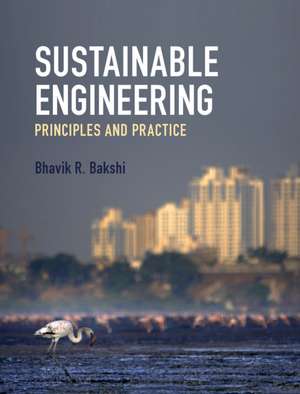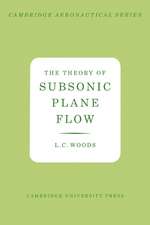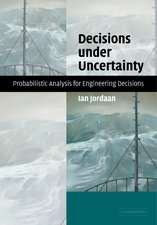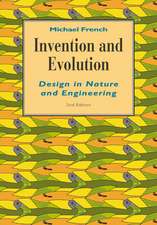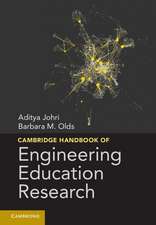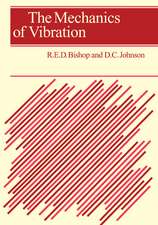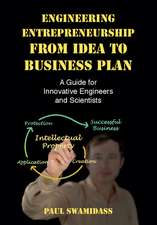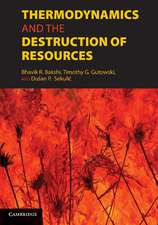Sustainable Engineering: Principles and Practice
Autor Bhavik R. Bakshien Limba Engleză Hardback – 12 iun 2019
Preț: 536.57 lei
Preț vechi: 583.23 lei
-8% Nou
Puncte Express: 805
Preț estimativ în valută:
102.69€ • 106.08$ • 85.46£
102.69€ • 106.08$ • 85.46£
Carte tipărită la comandă
Livrare economică 25 martie-08 aprilie
Preluare comenzi: 021 569.72.76
Specificații
ISBN-13: 9781108420457
ISBN-10: 1108420451
Pagini: 490
Ilustrații: 187 b/w illus. 87 tables 110 exercises
Dimensiuni: 192 x 253 x 27 mm
Greutate: 1.22 kg
Editura: Cambridge University Press
Colecția Cambridge University Press
Locul publicării:New York, United States
ISBN-10: 1108420451
Pagini: 490
Ilustrații: 187 b/w illus. 87 tables 110 exercises
Dimensiuni: 192 x 253 x 27 mm
Greutate: 1.22 kg
Editura: Cambridge University Press
Colecția Cambridge University Press
Locul publicării:New York, United States
Cuprins
Part I. Introduction and Motivation: 1. The basis of human well-being; 2. Status of ecosystem goods and services; 3. Sustainability: definitions and challenges; Part II. Reasons for Unsustainability: 4. Economics and the environment; 5. Business and the environment; 6. Science, engineering, and the environment; 7. Society and the environment; Part III. Sustainability Assessment: 8. Goal definition and scope; 9. Inventory analysis; 10. Mathematical framework; 11. Footprint assessment; 12. Energy and material flow analysis; 13. Exergy analysis; 14. Cumulative exergy consumption and emergy analysis; 15. Life cycle impact assessment; 16. Ecosystem services in sustainability impact assessment; Part IV. Solutions for Sustainability: 17. Designing sustainable processes and products; 18. Ecosystem ecology; 19. Industrial symbiosis and circular economy; 20. Ecosystems in engineering; 21. Economic policies; 22. Societal development.
Recenzii
'This book addresses such critical topics as life-cycle assessment, energy and material flows, exergy, sustainability assessment, engineering design, industrial symbiosis, and circular economy. The author utilizes various case studies/examples, such as the case of genetically modified organisms (GMOs) and the lessons from Easter Island. There are flowcharts and solved quantitative examples that make the introduced concepts less abstract. Each chapter is followed by exercises, making it easier to use for academic purpose / course assessment. I believe this text will be useful for advanced undergraduate or graduate-level college students, and that it is successful in its goal to rigorously address the role of engineering with respect to environmental sustainability, and to help engineers understand sustainability.' John W. Sutherland, Fehsenfeld Family Head of Environmental and Ecological Engineering, Purdue University
'In Sustainable Engineering, Bhavik R. Bakshi demonstrates that engineers and conservationists can be important allies. Using a variety of real-world examples and detailed case studies, Bakshi makes the case that engineering practices can lead to a sustainable future.' Mark R. Tercek, CEO of The Nature Conservancy and author of Nature's Fortune: How Business and Society Thrive by Investing in Nature
'Sustainable Engineering provides a comprehensive engineering treatment of sustainability. This is the only textbook covering many of the new approaches to sustainable engineering. Clear, succinct chapters, and the range of quantitative problems, make for a welcome textbook that will be widely useful for undergraduate engineering classes. It includes recent concepts such as water footprinting, energy return on investment, material flow analysis, energy analysis, ecosystem services calculations, techno-economic analysis, and industrial symbiosis. The problems are quantitative and thorough, with sufficient worked examples that they can be mastered in an introductory sustainable engineering course. The sustainability framing is broad and thorough, allowing undergraduates to see the big-picture context for sustainable engineering. References are also excellent, encouraging students to become familiar with key data sources, software, and the relevant scientific literature.' Valerie Thomas, Anderson Interface Professor of Natural Systems, Georgia Institute of Technology
'In Sustainable Engineering, Bhavik R. Bakshi demonstrates that engineers and conservationists can be important allies. Using a variety of real-world examples and detailed case studies, Bakshi makes the case that engineering practices can lead to a sustainable future.' Mark R. Tercek, CEO of The Nature Conservancy and author of Nature's Fortune: How Business and Society Thrive by Investing in Nature
'Sustainable Engineering provides a comprehensive engineering treatment of sustainability. This is the only textbook covering many of the new approaches to sustainable engineering. Clear, succinct chapters, and the range of quantitative problems, make for a welcome textbook that will be widely useful for undergraduate engineering classes. It includes recent concepts such as water footprinting, energy return on investment, material flow analysis, energy analysis, ecosystem services calculations, techno-economic analysis, and industrial symbiosis. The problems are quantitative and thorough, with sufficient worked examples that they can be mastered in an introductory sustainable engineering course. The sustainability framing is broad and thorough, allowing undergraduates to see the big-picture context for sustainable engineering. References are also excellent, encouraging students to become familiar with key data sources, software, and the relevant scientific literature.' Valerie Thomas, Anderson Interface Professor of Natural Systems, Georgia Institute of Technology
Notă biografică
Descriere
A multidisciplinary introduction to sustainable engineering exploring challenges and solutions through practical examples and exercises.
